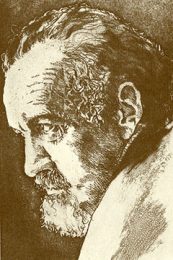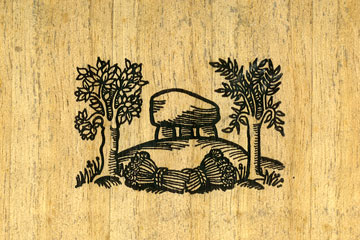Literary history buffs, Irish poetry lovers and scholars can now enjoy tracing the steps of Irish publisher Liam Miller and his renowned Dolmen Press at Wake Forest University’s Z. Smith Reynolds Library. After nearly 20 years of careful documentation and cataloging, the library announces the official introduction of the archive.

Liam Miller
Following Miller’s death in 1987, Wake Forest purchased Miller’s personal papers and the Dolmen Press Archive. The archive includes manuscripts, papers, correspondence and artwork that track the history of the Dolmen Press and reflect the lives of prominent Irish poets, including William Butler Yeats, John Montague, Thomas Kinsella and others. One of the highlights of the collection is a series of illustrative printing blocks dating from 1902 to 1985, including a few from Cuala Press, the private printing press founded by Yeats’ sisters Elizabeth and Lily.
“It’s very exciting to have this collection here,” said Sharon Snow, team leader for special collections at Wake Forest’s Z. Smith Reynolds Library. “It is such a rich collection, one of the premier Irish studies collections in the world and the largest collection we have at Wake Forest.”
Dillon Johnston, renowned Irish scholar, founder of Wake Forest University Press and professor of English at Washington University in St. Louis, said the archive is Wake Forest’s contribution to scholarship.
“It is the function of the university not only to study the past, but also to have parts of it available,” Johnston said. “If anyone is going to continue to connect the past with the present or use the future to interpret the past, there needs to be archives and hard evidence of those connections.”

The Dolmen Press logo
Richard Murdoch, a book designer and archivist at Reynolda House Museum of American Art; Ed Wilson, provost emeritus and former professor of English at Wake Forest; and Johnston were the three men instrumental in the purchase of the Dolmen Archive. They knew Liam Miller was an important figure internationally. They knew book publishers highly regarded him and his press.
In 1975, Johnston visited Miller and told him about Wake Forest’s idea to establish a press. He said Miller was “delighted that someone in America was interested in Irish poetry publishing.” Miller showed his support by attending the inauguration of Wake Forest University Press and co-publishing its first two books. The Dolmen Press name was instrumental in helping Wake Forest University Press gain early recognition and credibility among Irish poets, and now today, it is considered the premier publisher of Irish poetry in North America.
To celebrate the archive’s completion, selected items from the exhibit will be on display from March 16 to Aug. 1 in the Rare Books Reading Room and the Atrium of the Z. Smith Reynolds Library. A special opening event, also in honor of the 30th anniversary of Wake Forest Press, will be held from 4 p.m. – 6 p.m. March 16 during Wake Forest’s 9th Annual Irish Festival. The event, titled “Portals of Culture: An Exhibition and Discussion of the Dolmen Press Archive and Wake Forest University Press,” will feature a panel of scholars who will share the historical significance of the Dolmen Press and its connection to Wake Forest and its press.
“God Keep My Jewel,” an image from the Dolmen Press Manuscript.
Panelists will include Johnston; T.D. Redshaw, professor of English at the University of St. Thomas in St. Paul, Minn.; and Derval Tubridy, a lecturer at Goldsmiths College at the University of London.
“Although we will celebrate the archive’s official introduction at the Irish Festival, it has always been available for researchers and historians,” said Snow. “We have had visitors from Ireland, England and across the U.S. use it. Now, I really hope that the general public will come see the exhibit and use the archive.”
The exhibit and event are free and open to the public. The Dolmen Archive is a permanent collection and will be available for use during regular rare books department hours, 8:30 a.m. – 5 p.m. Monday through Friday. Appointments are encouraged. To schedule an appointment, call (336) 758-5755.
Categories: Arts & Culture, University Announcement
Headlines
Wake Forest in the News
Wake Forest regularly appears in media outlets around the world.




